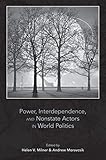Power, Interdependence, and Nonstate Actors in World Politics / ed. by Andrew Moravcsik, Helen V. Milner.
Material type: TextPublisher: Princeton, NJ : Princeton University Press, [2009]Copyright date: ©2009Edition: Course BookDescription: 1 online resource (320 p.) : 6 halftones. 2 line illus. 14 tablesContent type:
TextPublisher: Princeton, NJ : Princeton University Press, [2009]Copyright date: ©2009Edition: Course BookDescription: 1 online resource (320 p.) : 6 halftones. 2 line illus. 14 tablesContent type: - 9780691140285
- 9781400830787
- 341.2
- JZ4841 .P68 2011
- online - DeGruyter
- Issued also in print.
| Item type | Current library | Call number | URL | Status | Notes | Barcode | |
|---|---|---|---|---|---|---|---|
 eBook
eBook
|
Biblioteca "Angelicum" Pont. Univ. S.Tommaso d'Aquino Nuvola online | online - DeGruyter (Browse shelf(Opens below)) | Online access | Not for loan (Accesso limitato) | Accesso per gli utenti autorizzati / Access for authorized users | (dgr)9781400830787 |
Frontmatter -- Contents -- Figures And Tables -- Contributors -- Preface -- Introduction -- CHAPTER 1. Power, Interdependence, And Nonstate Actors In World Politics -- Institutions And Power -- CHAPTER 2. Institutions, Power, And Interdependence -- CHAPTER 3. The Transaction Costs Approach To International Institutions -- CHAPTER 4. The Influence Of International Institutions Institutional Design, Compliance, Effectiveness, And Endogeneity -- The Role Of Institutions Across Issue Areas -- CHAPTER 5. Peacekeepers As Signals The Demand For International Peacekeeping In Civil Wars -- CHAPTER 6. Women And International Institutions The Effects Of The Women'S Convention On Female Education -- CHAPTER 7. Private Governance For The Public Good? Exploring Private Sector Participation In Global Financial Regulation -- CHAPTER 8. Power, Interdependence, And Domestic Politics In International Environmental Cooperation -- CHAPTER 9. The Dynamics Of Trade Liberalization -- Power And Interdependence In A Globalized World -- CHAPTER 10. International Intellectual Property Rights In A Networked World -- CHAPTER 11. The Big Influence Of Big Allies Transgovernmental Relations As A Tool Of Statecraft -- CHAPTER 12. On Taking Religious Worldviews Seriously -- Afterword -- CHAPTER 13. Robert Keohane: Political Theorist -- Bibliography -- Index
restricted access online access with authorization star
http://purl.org/coar/access_right/c_16ec
Since they were pioneered in the 1970s by Robert Keohane and others, the broad range of neoliberal institutionalist theories of international relations have grown in importance. In an increasingly globalized world, the realist and neorealist focus on states, military power, conflict, and anarchy has more and more given way to a recognition of the importance of nonstate actors, nonmilitary forms of power, interdependence, international institutions, and cooperation. Drawing together a group of leading international relations theorists, this book explores the frontiers of new research on the role of such forces in world politics. The topics explored in these chapters include the uneven role of peacekeepers in civil wars, the success of human rights treaties in promoting women's rights, the disproportionate power of developing countries in international environmental policy negotiations, and the prospects for Asian regional cooperation. While all of the chapters demonstrate the empirical and theoretical vitality of liberal and institutionalist theories, they also highlight weaknesses that should drive future research and influence the reform of foreign policy and international organizations. In addition to the editors, the contributors are Vinod Aggarawal, Jonathan Aronson, Elizabeth DeSombre, Page Fortna, Michael Gilligan, Lisa Martin, Timothy McKeown, Ronald Mitchell, Layna Mosley, Beth Simmons, Randall Stone, and Ann Tickner.
Issued also in print.
Mode of access: Internet via World Wide Web.
In English.
Description based on online resource; title from PDF title page (publisher's Web site, viewed 30. Aug 2021)


